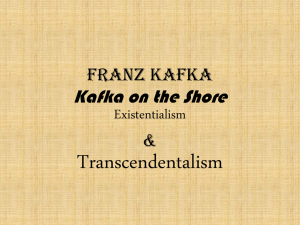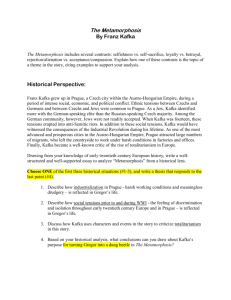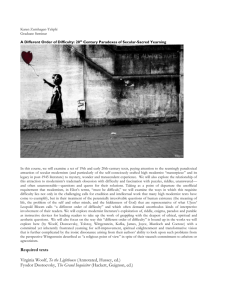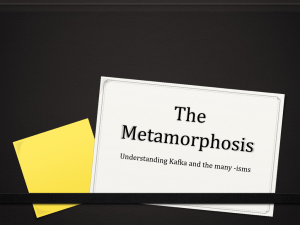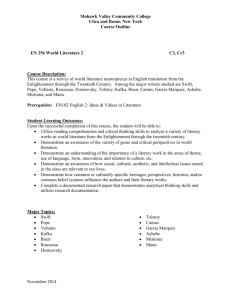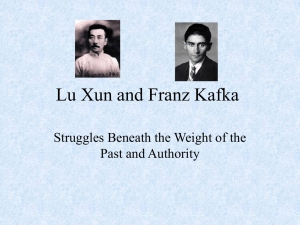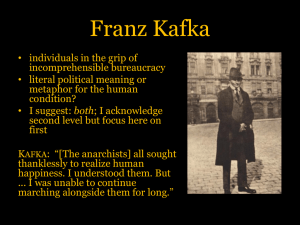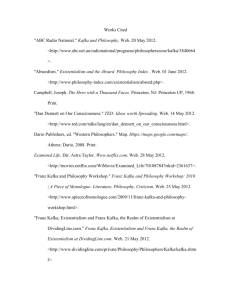CL 212 Kafka, Coetzee and the Difficulty of Reality
advertisement
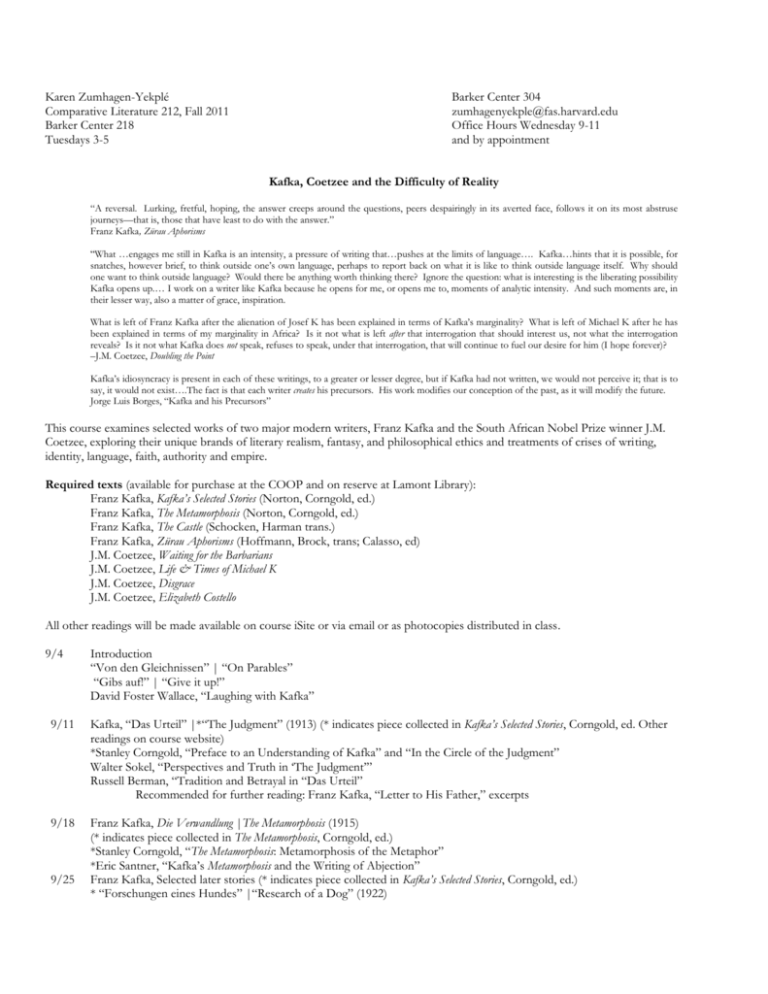
Karen Zumhagen-Yekplé Comparative Literature 212, Fall 2011 Barker Center 218 Tuesdays 3-5 Barker Center 304 zumhagenyekple@fas.harvard.edu Office Hours Wednesday 9-11 and by appointment Kafka, Coetzee and the Difficulty of Reality “A reversal. Lurking, fretful, hoping, the answer creeps around the questions, peers despairingly in its averted face, follows it on its most abstruse journeys—that is, those that have least to do with the answer.” Franz Kafka, Zürau Aphorisms “What …engages me still in Kafka is an intensity, a pressure of writing that…pushes at the limits of language…. Kafka…hints that it is possible, for snatches, however brief, to think outside one’s own language, perhaps to report back on what it is like to think outside language itself. Why should one want to think outside language? Would there be anything worth thinking there? Ignore the question: what is interesting is the liberating possibility Kafka opens up.… I work on a writer like Kafka because he opens for me, or opens me to, moments of analytic intensity. And such moments are, in their lesser way, also a matter of grace, inspiration. What is left of Franz Kafka after the alienation of Josef K has been explained in terms of Kafka’s marginality? What is left of Michael K after he has been explained in terms of my marginality in Africa? Is it not what is left after that interrogation that should interest us, not what the interrogation reveals? Is it not what Kafka does not speak, refuses to speak, under that interrogation, that will continue to fuel our desire for him (I hope forever)? –J.M. Coetzee, Doubling the Point Kafka’s idiosyncracy is present in each of these writings, to a greater or lesser degree, but if Kafka had not written, we would not perceive it; that is to say, it would not exist….The fact is that each writer creates his precursors. His work modifies our conception of the past, as it will modify the future. Jorge Luis Borges, “Kafka and his Precursors” This course examines selected works of two major modern writers, Franz Kafka and the South African Nobel Prize winner J.M. Coetzee, exploring their unique brands of literary realism, fantasy, and philosophical ethics and treatments of crises of writing, identity, language, faith, authority and empire. Required texts (available for purchase at the COOP and on reserve at Lamont Library): Franz Kafka, Kafka’s Selected Stories (Norton, Corngold, ed.) Franz Kafka, The Metamorphosis (Norton, Corngold, ed.) Franz Kafka, The Castle (Schocken, Harman trans.) Franz Kafka, Zürau Aphorisms (Hoffmann, Brock, trans; Calasso, ed) J.M. Coetzee, Waiting for the Barbarians J.M. Coetzee, Life & Times of Michael K J.M. Coetzee, Disgrace J.M. Coetzee, Elizabeth Costello All other readings will be made available on course iSite or via email or as photocopies distributed in class. 9/4 Introduction “Von den Gleichnissen” | “On Parables” “Gibs auf!” | “Give it up!” David Foster Wallace, “Laughing with Kafka” 9/11 Kafka, “Das Urteil” |*“The Judgment” (1913) (* indicates piece collected in Kafka’s Selected Stories, Corngold, ed. Other readings on course website) *Stanley Corngold, “Preface to an Understanding of Kafka” and “In the Circle of the Judgment” Walter Sokel, “Perspectives and Truth in ‘The Judgment’” Russell Berman, “Tradition and Betrayal in “Das Urteil” Recommended for further reading: Franz Kafka, “Letter to His Father,” excerpts 9/18 Franz Kafka, Die Verwandlung |The Metamorphosis (1915) (* indicates piece collected in The Metamorphosis, Corngold, ed.) *Stanley Corngold, “The Metamorphosis: Metamorphosis of the Metaphor” *Eric Santner, “Kafka’s Metamorphosis and the Writing of Abjection” Franz Kafka, Selected later stories (* indicates piece collected in Kafka’s Selected Stories, Corngold, ed.) * “Forschungen eines Hundes” |“Research of a Dog” (1922) 9/25 *“Josephine, die Sängerin oder Das Volk der Mäuse” | Josephine the Singer or the Mouse Folk”(1924) *“Erstes Leid” |“First Distress” (1921-22) *“Ein Hungerkünstler” |“A Hunger Artist” (1924) *“Der Bau” |“The Burrow” (1923-24) Ruth V. Gross, “Hunting Kafka out of season: enigmatics in the short fictions” Stanley Corngold, “Something to Do with the Truth: Kafka’s Later Stories” Recommended for further reading: Franz Kafka, "An Introductory Talk on the Yiddish Language" (Dearest Father, 381-386) *Nicola Gess, “The Politics of Listening: The Power of Song in Kafka’s ‘Josephine, the Singer’” J.M. Coetzee, “Kafka: Interview” and “Tense, Time and Aspect in Kafka’s ‘The Burrow,’” Doubling the Point* James Rolleston, “Purification unto Death: ‘A Hunger Artist’ as Allegory of Modernism” 10/2 Franz Kafka, Das Schloss |The Castle I-XIV Pericles Lewis, “Franz Kafka and the Hermeneutics of Suspicion” Walter Sokel, “Between Gnosticism and Jehovah: The Dilemma in Kafka’s Religious Attitude Recommended for further reading: Walter Benjamin, “Franz Kafka. On the Tenth Anniversary of His Death” Theodor Adorno, “Notes on Kafka,” Prisms 10/9 Franz Kafka, The Castle XV-Appendix Franz Kafka, The Zürau Aphorisms Recommended for further reading: Richie Robertson, “Kafka’s Zürau Aphorisms” Richard T. Gray, “Constructive Destruction: Kafka’s Aphorisms: Literary Tradition and Literary Transformation” Helen Milfull, “The Theological Position of Franz Kafka’s Aphorisms” 10/16 Franz Kafka, selected stories “In der Strafkolonie” |“In the Penal Colony” (1919) “Ein Bericht für eine Akademie” | “Report to an Academy” “Schakale und Araber” | “Jackals and Arabs” “Beim Bau der Chinesischen Mauer” |“Building the Great Wall of China” Recommended for further reading: Chana Kronfeld, “Introduction,” On the Margins of Modernism Walter Sokel, “Identity and the Individual, or Past and Present: Franz Kafka’s ‘A Report to an Academy’ in a Psychoanalytic and a Sociohistorical Context” Gilles Deleuze and Félix Guattari, Kafka: Toward a Minor Literature, selections (“Content and Expression,” “An Exaggerated Oedipus”; “What is a Minor Literature?”) 10/19 First conference-length paper (option 1) due 10/23 No Class 10/30 J.M. Coetzee, Waiting for the Barbarians Michael Valdez Moses, “The Mark of Empire: Writing History and Torture in Coetzee’s Waiting for the Barbarians” Jane Poyner, “Madness and Civilization in Waiting for the Barbarians” Bill Ashcroft, “Irony, Allegory and Empire: Waiting for the Barbarians and In the Heart of the Country 11/6 J.M. Coetzee, The Life & Times of Michael K Derek Attridge, Against Allegory: Waiting for the Barbarians and The Life & Times of Michael K 11/13 J.M. Coetzee, Disgrace Derek Attridge, “Age of Bronze, State of Grace” Alice Crary, “J.M. Coetzee, Moral Thinker” Recommended for further reading: Nadine Gordimer, “The Idea of Gardening” Adriaan van Heerden, “Disgrace, Desire and the Dark Side of the New South Africa” Jane Poyner, “Truth and Reconciliation in Disgrace” Rosemary Jolly, “Going to the Dogs: Humanity in J.M. Coetzee’s Disgrace, The Lives of Animals and South Africa’s Truth and Reconciliation Commission” 11/20 J.M. Coetzee, Disgrace/Elizabeth Costello Cora Diamond, “The Difficulty of Philosophy and the Difficulty of Reality” Martin Puchner, “J.M. Coetzee’s Novels of Thinking” Recommended further reading: Daniel Medin, “J.M. Coetzee: Elizabeth Costello” Chris Danta, “’Like a dog . . . like a lamb’: Becoming Sacrificial Animal in Kafka and Coetzee” 11/27 J.M. Coetzee, Elizabeth Costello Franz Kafka, “Vor dem Gesetz” |“Before the Law” Derek Attridge, “Epilogue: A Writers Life” Frank Kermode, “Hoti’s Business: Why Are Narratives Obscure?,” The Genesis of Secrecy Recommended for further reading: Michael Funk Deckard and Ralph Palm, “Irony and Belief in Elizabeth Costello” Jacques Derrida, “Before the Law,” Acts of Literature Giorgio Agamben, “Form of Law,” Homo Sacer. Sovereign Power and Bare Life Paper prospectus and annotated bibliographies due 12/4 Elizabeth Costello Hugo von Hofmannsthal, “The Letter of Lord Chandos” Stephen Mulhall, from The Wounded Animal 12/14 Second conference-length paper (option 1) or final article-length paper (option 2) due Course Requirements: Engaged reading of course material; consistent, active participation in class discussions Seminar paper(s): Either Option 1, two seminar papers (conference-length—around 10 pages due in the middle and at the end of the term) OR Option 2, one seminar paper (article-length—around 20 pages—due at the end of the term). Weekly discussion questions Students will submit at least two questions about course readings for class discussion each week. Issues you’d like to see discussed, points of confusion or interpretation, etc. are to be emailed to me by 7:00 pm on Mondays the day before class. Presentations of course material/discussion leading (one or two times per semester) By 7 pm on the day before you are scheduled to present and lead discussion, the presenter must send me by email a concise statement including, 1. An indication of which primary and/or secondary text(s) (or parts/aspects of those texts) you will cover as well as of your general line of interpretation or inquiry and whatever lessons, insights or ideas you aim to convey to the class; 2. an outline of the direction your arguments will likely take and the textual examples you’ll likely refer to. In addition, whoever is presenting in a given week should formulate a set of questions, to be distributed to the class, that offer a general framework for the discussion. These questions can go beyond the scope of the presentation, but should intersect, at least in part, with the more intensive focus of the presentation. Accommodations for students with disabilities Students needing academic adjustments or accommodations because of a disability documented in a letter from the Accessible Education Office (AEO) should speak with me confidentially by the end of the second week of the term to discuss appropriate implementation of course or room adjustments. For Harvard’s stance on academic integrity in Papers and Other Written Assignments, please visit the FAS link below: http://webdocs.registrar.fas.harvard.edu/faculty_handbook/current/chapter3/PapersOther.html
